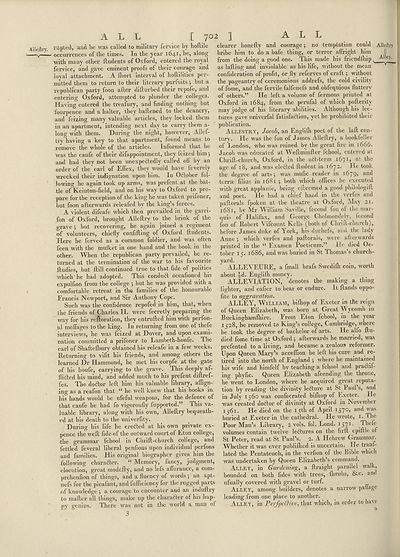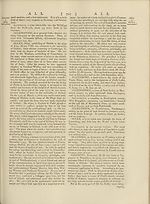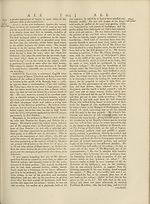Encyclopaedia Britannica, or, a Dictionary of arts, sciences, and miscellaneous literature : enlarged and improved. Illustrated with nearly six hundred engravings > Volume 1, A-AME
(748) Page 702
Download files
Complete book:
Individual page:
Thumbnail gallery: Grid view | List view

ALL [ 702 ] ALL
rapted, and he was called to military fervice by hoflile
occurrences of the times. In the year 1641, he, along
with many other Undents of Oxford, entered the royal
fervice, and gave eminent proofs ol their courage and
loyal attachment. A Ihort interval of hoftilities per¬
mitted them to return to their literary purfuits j but a
republican party foon alter difturbed their repole, and
entering Oxford, attempted to plunder the colleges.
Having entered the treafury, and finding nothing but
fourpence and a halter, they hattened to the deanery,
and feizing many valuable articles, they locked them
in an apartment, intending next day to carry them a-
long with them. During the night, however, Allef-
try having a key to that apartment, found means to
remove the whole of the articles. Informed that he
was the caufe of their difappointment, they leized him;
and had they not been unexpeftedly called off by an
order of the earl of Effex, they would have feverely
wrecked their indignation upon him. In Oftober lol-
lowing he again took up arms, was prefent at the bat¬
tle of Keinton-field, and on his way to Oxford to pre-
pare for the reception ol the king he was taken pnfoner,
but foon afterwards releafed by the king’s torces.
A violent difeafe which then prevailed in the garri-
fon of Oxford, brought Alleftry to the brink ot the
grave 5 but recovering, he again joined a regiment
of volunteers, chiefly confifting of Oxford Undents.
Here he ferved as a common foldier, and was often
feen with the mulket in one hand and the book in the
other. When the republican party prevailed, he re¬
turned at the termination of the war to his favourite
lludies, but Hill continued true to that fide ol politics
which'he had adopted. This conduct occafioned his
expulfion from the college *, but he was provided with a
comfortable retreat in the families of the honourable
Francis Newport, and Sir Anthony Cope.
Such was the confidence repofed in him, that, when
the friends of Charles II. were fecretly preparing the
way for his reiteration, they entrufted him with perion-
al meffages to the king. In returning from one of thefe
interviews, he was feized at Dover, and upon exami¬
nation committed a prifoner to Lambeth-houfe. Hie
earl of Shaftelbury obtained his releafe in a few weeks.
Returning to vifit his friends, and among others the
learned Dr Hammond, he met his corpfe at the gate
of his houfe, carrying to the grave. This deeply af¬
flicted his mind, and added much to his prefent dillref-
fes. The doftor left him his valuable library, aflign-
ing as a realon that 44 he well knew that his books in
his hands would be ufeful weapons, for the defence ol
that caufe he had fo vigoroully fupported.” This va¬
luable library, along with his own, Alleltry bequeath¬
ed at his death to the univerfity.
During his life he erected at his own private ex¬
pence the weft fide of the outward court of Eton college,
the grammar fchool in Chrift-church college, and
fettled feveral liberal penfions upon individual perfons
and families. His original biographer gives him the
following character. “ Memory, fancy, judgment,
elocution, great modefty, and no lefs allurance, a com-
prehenfion of things, and a fluency of words; an apt-
nefs for the pleafant, and fufficiency for the rugged parts
<of knowledge ; a courage to encounter and an induftry
to mailer all things, make up the character of his hap¬
py genius. There was not in the world a man of
3
clearer honefty and courage 5 no temptation could Alleftry 1
bribe him to do a bale thing, or terror affright him ||
from the doing a good one. This made his friendfliip, A1|cy~
as lafting and inviolable as his life, without the mean
confideration of profit, or fly referves of craft ; without
the pageantry of ceremonious addrefs, the cold civility
of fome, and the fervile falfenefs and oblequious flattery
of others.” He left a volume of fermons printed at
Oxford in 1684, from the perufal of which pollerity
may judge of his literary abilities. Although his lec¬
tures gave univerfal fatisfaefion, yet he prohibited their
publication.
Allestry, Jacob, an Englilh poet of the lafl cen¬
tury. He was the fon of James Alleflry, a bookleller
of London, who was ruined by the great fire in 1666.
Jacob was educated at W efcminfter fchool, entered at
Chrift-church, Oxford, in the a£t-term ifiyx, at the
age of 18, and was ele&ed ftudent in 1672. He took
the degree of arts-, was mufic reader in 1679, ani*
terrae filius in 1681 ; both which offices he executed
with great applauie, being efteemed a good philologift
and poet. He had a chief hand in the verfes and
paftorals fpoken at the theatre at Oxford, May 21.
1681, by Mr William Saville, fecund fon of the mar¬
quis of Halifax, and George Cholmondely, fecond
fon of Robert Yifcount Hells (both of Chrift-church),
before James duke of York, his duchefs, and the lady
Anne ", which verfes and paftorals, were afterwards
printed in the “ Examen Roeticum.” He died Oc¬
tober 15. 1686, and was buried in St Thomas’s church¬
yard.
ALLEVEURE, a fmall brafs Swedifli coin, worth
about 4-d. Englifli money.
ALLEVIATION, denotes the making a thing
lighter, and eafier to bear or endure. It Hands oppo-
fite to aggravation.
ALLEY, William, biffiop of Exeter in the reign
of Queen Elizabeth, was born at Great Wycomb in
Buckinghamfhire. From Eton fchool, in the year
1528, he removed to King’s college, Cambridge, where
he took the degree ot bachelor of arts. He alfo ftu-
died fome time at Oxford; afterwards he married, was
prefented to a living, and became a zealous reformer.
Upon Queen Mary’s acceffion he left his cure and^ re¬
tired into the north of England ", where he maintained
his wife and himfelf by teaching a fchool and pradlif-
ing phyfic. Queen Elizabeth afeending the throne,
he went to London, where he acquired great reputa¬
tion by reading the divinity ledture at St Raul s, and
in July 1560 was confecrated bifliop of Exeter. He
was created dodtor of divinity at Oxford in November
1561. He died on the 15th of April \§*]0, and was
buried at Exeter in the cathedral. He wrote, 1. The
Poor Man’s Library, 2 vols. fol. Lond. 1571- Thefe
volumes contain twelve lectures on the firft epiftle of
St Peter, read at St Raul’s. 2. A Hebrew Grammar.
Whether it was ever publifhed is uncertain. He tranf-
lated the Pentateuch, in the verfion of the Bible which
was undertaken by Queen Elizabeth’s command.
Alley, in Gardening, a ftraight parallel walk,
bounded on both fides with trees, flrrubs, &c. and
ufually covered with gravel or turf.
Alley, among builders, denotes a narrow pailage
leading from one place to another.
Alley, in Perfpeflive, that which, in order to ha\e
rapted, and he was called to military fervice by hoflile
occurrences of the times. In the year 1641, he, along
with many other Undents of Oxford, entered the royal
fervice, and gave eminent proofs ol their courage and
loyal attachment. A Ihort interval of hoftilities per¬
mitted them to return to their literary purfuits j but a
republican party foon alter difturbed their repole, and
entering Oxford, attempted to plunder the colleges.
Having entered the treafury, and finding nothing but
fourpence and a halter, they hattened to the deanery,
and feizing many valuable articles, they locked them
in an apartment, intending next day to carry them a-
long with them. During the night, however, Allef-
try having a key to that apartment, found means to
remove the whole of the articles. Informed that he
was the caufe of their difappointment, they leized him;
and had they not been unexpeftedly called off by an
order of the earl of Effex, they would have feverely
wrecked their indignation upon him. In Oftober lol-
lowing he again took up arms, was prefent at the bat¬
tle of Keinton-field, and on his way to Oxford to pre-
pare for the reception ol the king he was taken pnfoner,
but foon afterwards releafed by the king’s torces.
A violent difeafe which then prevailed in the garri-
fon of Oxford, brought Alleftry to the brink ot the
grave 5 but recovering, he again joined a regiment
of volunteers, chiefly confifting of Oxford Undents.
Here he ferved as a common foldier, and was often
feen with the mulket in one hand and the book in the
other. When the republican party prevailed, he re¬
turned at the termination of the war to his favourite
lludies, but Hill continued true to that fide ol politics
which'he had adopted. This conduct occafioned his
expulfion from the college *, but he was provided with a
comfortable retreat in the families of the honourable
Francis Newport, and Sir Anthony Cope.
Such was the confidence repofed in him, that, when
the friends of Charles II. were fecretly preparing the
way for his reiteration, they entrufted him with perion-
al meffages to the king. In returning from one of thefe
interviews, he was feized at Dover, and upon exami¬
nation committed a prifoner to Lambeth-houfe. Hie
earl of Shaftelbury obtained his releafe in a few weeks.
Returning to vifit his friends, and among others the
learned Dr Hammond, he met his corpfe at the gate
of his houfe, carrying to the grave. This deeply af¬
flicted his mind, and added much to his prefent dillref-
fes. The doftor left him his valuable library, aflign-
ing as a realon that 44 he well knew that his books in
his hands would be ufeful weapons, for the defence ol
that caufe he had fo vigoroully fupported.” This va¬
luable library, along with his own, Alleltry bequeath¬
ed at his death to the univerfity.
During his life he erected at his own private ex¬
pence the weft fide of the outward court of Eton college,
the grammar fchool in Chrift-church college, and
fettled feveral liberal penfions upon individual perfons
and families. His original biographer gives him the
following character. “ Memory, fancy, judgment,
elocution, great modefty, and no lefs allurance, a com-
prehenfion of things, and a fluency of words; an apt-
nefs for the pleafant, and fufficiency for the rugged parts
<of knowledge ; a courage to encounter and an induftry
to mailer all things, make up the character of his hap¬
py genius. There was not in the world a man of
3
clearer honefty and courage 5 no temptation could Alleftry 1
bribe him to do a bale thing, or terror affright him ||
from the doing a good one. This made his friendfliip, A1|cy~
as lafting and inviolable as his life, without the mean
confideration of profit, or fly referves of craft ; without
the pageantry of ceremonious addrefs, the cold civility
of fome, and the fervile falfenefs and oblequious flattery
of others.” He left a volume of fermons printed at
Oxford in 1684, from the perufal of which pollerity
may judge of his literary abilities. Although his lec¬
tures gave univerfal fatisfaefion, yet he prohibited their
publication.
Allestry, Jacob, an Englilh poet of the lafl cen¬
tury. He was the fon of James Alleflry, a bookleller
of London, who was ruined by the great fire in 1666.
Jacob was educated at W efcminfter fchool, entered at
Chrift-church, Oxford, in the a£t-term ifiyx, at the
age of 18, and was ele&ed ftudent in 1672. He took
the degree of arts-, was mufic reader in 1679, ani*
terrae filius in 1681 ; both which offices he executed
with great applauie, being efteemed a good philologift
and poet. He had a chief hand in the verfes and
paftorals fpoken at the theatre at Oxford, May 21.
1681, by Mr William Saville, fecund fon of the mar¬
quis of Halifax, and George Cholmondely, fecond
fon of Robert Yifcount Hells (both of Chrift-church),
before James duke of York, his duchefs, and the lady
Anne ", which verfes and paftorals, were afterwards
printed in the “ Examen Roeticum.” He died Oc¬
tober 15. 1686, and was buried in St Thomas’s church¬
yard.
ALLEVEURE, a fmall brafs Swedifli coin, worth
about 4-d. Englifli money.
ALLEVIATION, denotes the making a thing
lighter, and eafier to bear or endure. It Hands oppo-
fite to aggravation.
ALLEY, William, biffiop of Exeter in the reign
of Queen Elizabeth, was born at Great Wycomb in
Buckinghamfhire. From Eton fchool, in the year
1528, he removed to King’s college, Cambridge, where
he took the degree ot bachelor of arts. He alfo ftu-
died fome time at Oxford; afterwards he married, was
prefented to a living, and became a zealous reformer.
Upon Queen Mary’s acceffion he left his cure and^ re¬
tired into the north of England ", where he maintained
his wife and himfelf by teaching a fchool and pradlif-
ing phyfic. Queen Elizabeth afeending the throne,
he went to London, where he acquired great reputa¬
tion by reading the divinity ledture at St Raul s, and
in July 1560 was confecrated bifliop of Exeter. He
was created dodtor of divinity at Oxford in November
1561. He died on the 15th of April \§*]0, and was
buried at Exeter in the cathedral. He wrote, 1. The
Poor Man’s Library, 2 vols. fol. Lond. 1571- Thefe
volumes contain twelve lectures on the firft epiftle of
St Peter, read at St Raul’s. 2. A Hebrew Grammar.
Whether it was ever publifhed is uncertain. He tranf-
lated the Pentateuch, in the verfion of the Bible which
was undertaken by Queen Elizabeth’s command.
Alley, in Gardening, a ftraight parallel walk,
bounded on both fides with trees, flrrubs, &c. and
ufually covered with gravel or turf.
Alley, among builders, denotes a narrow pailage
leading from one place to another.
Alley, in Perfpeflive, that which, in order to ha\e
Set display mode to:
![]() Universal Viewer |
Universal Viewer | ![]() Mirador |
Large image | Transcription
Mirador |
Large image | Transcription
Images and transcriptions on this page, including medium image downloads, may be used under the Creative Commons Attribution 4.0 International Licence unless otherwise stated. ![]()
| Permanent URL | https://digital.nls.uk/193141709 |
|---|
| Attribution and copyright: |
|
|---|
| Description | Ten editions of 'Encyclopaedia Britannica', issued from 1768-1903, in 231 volumes. Originally issued in 100 weekly parts (3 volumes) between 1768 and 1771 by publishers: Colin Macfarquhar and Andrew Bell (Edinburgh); editor: William Smellie: engraver: Andrew Bell. Expanded editions in the 19th century featured more volumes and contributions from leading experts in their fields. Managed and published in Edinburgh up to the 9th edition (25 volumes, from 1875-1889); the 10th edition (1902-1903) re-issued the 9th edition, with 11 supplementary volumes. |
|---|---|
| Additional NLS resources: |
|

